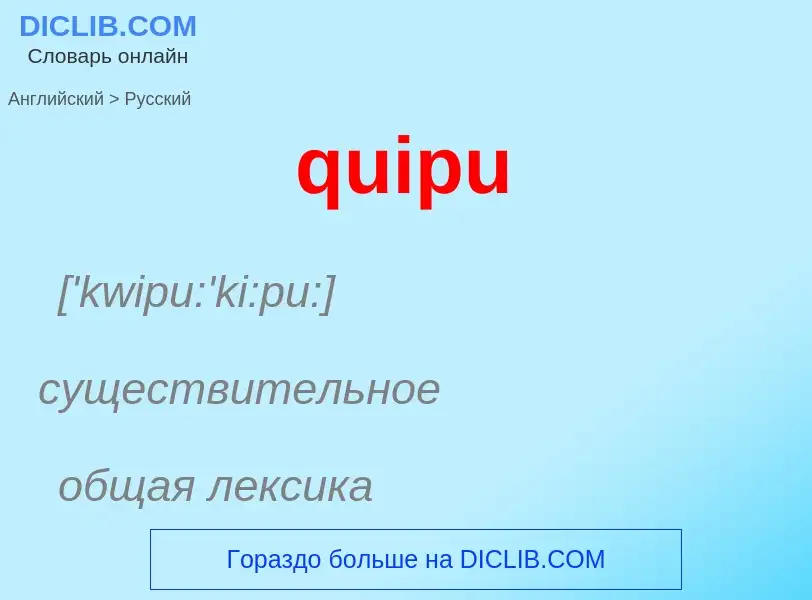Перевод и анализ слов искусственным интеллектом ChatGPT
На этой странице Вы можете получить подробный анализ слова или словосочетания, произведенный с помощью лучшей на сегодняшний день технологии искусственного интеллекта:
- как употребляется слово
- частота употребления
- используется оно чаще в устной или письменной речи
- варианты перевода слова
- примеры употребления (несколько фраз с переводом)
- этимология
quipu - перевод на русский
['kwipu:'ki:pu:]
существительное
общая лексика
кипу
узелковое письмо древних перуанцев
Определение
Википедия

Quipu (also spelled khipu) are recording devices fashioned from strings historically used by a number of cultures in the region of Andean South America.
A quipu usually consisted of cotton or camelid fiber strings. The Inca people used them for collecting data and keeping records, monitoring tax obligations, collecting census records, calendrical information, and for military organization. The cords stored numeric and other values encoded as knots, often in a base ten positional system. A quipu could have only a few or thousands of cords. The configuration of the quipus has been "compared to string mops." Archaeological evidence has also shown the use of finely carved wood as a supplemental, and perhaps sturdier, base to which the color-coded cords would be attached. A relatively small number have survived.
Objects that can be identified unambiguously as quipus first appear in the archaeological record in the first millennium AD (though debated quipus are much earlier). They subsequently played a key part in the administration of the Kingdom of Cusco and later the Inca Empire, flourishing across the Andes from c. 1100 to 1532 AD. As the region was subsumed under the Spanish Empire, quipus were mostly replaced by European writing and numeral systems, and some quipu were identified as idolatrous and destroyed, but some Spaniards promoted the adaptation of the quipu recording system to the needs of the colonial administration, and some priests advocated the use of quipus for ecclesiastical purposes. In several modern villages, quipus have continued to be important items for the local community. It is unclear how many intact quipus still exist and where, as many have been stored away in mausoleums.
Knotted strings unrelated to quipu have been used to record information by the ancient Chinese, Tibetans and Japanese.
Quipu is the Spanish spelling and the most common spelling in English. Khipu (pronounced [ˈkʰɪpʊ], plural: khipukuna) is the word for "knot" in Cusco Quechua. In most Quechua varieties, the term is kipu.


![El primer nueva corónica]]''. On the lower left is a [[yupana]] – an Inca calculating device. El primer nueva corónica]]''. On the lower left is a [[yupana]] – an Inca calculating device.](https://commons.wikimedia.org/wiki/Special:FilePath/Nueva corónica y buen gobierno (1936 facsimile) p360.png?width=200)


